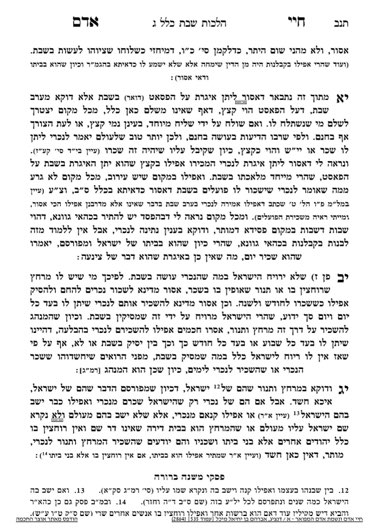We have finished siman 12. We learned that even when the Jew does not receive direct benefit from the work performed by the non-Jew on Shabbos (because the non-Jew pays a fixed fee to the Jew and keeps all of the profits), there can still be an issue of maris ayin. In simanim 13. 14 and 15, the Chayei Adam discusses the idea that depending on the standard minhag, there may be ways to address issues of maris ayin.
In siman 16. 17. 18 and 19, the Chayei Adam discusses different practical examples of situations in which there is and is not a concern for maris ayin, depending on the standard minhag.
Siman 20 is the eighth and final criterion for it to be permitted to make an arrangement with a non-Jew before Shabbos regarding melacha on Shabbos. We learned that the primary criteria are that the non-Jew is hired as a kablan, and there is a fixed price set before Shabbos. The seventh criterion was that the Jew cannot gain any economic benefit from the work which the non-Jew is doing on Shabbos.
The eighth criteria is that the non-Jew cannot be benefiting the Jew by working on Shabbos in that the non-Jew is now free to do other work during the week. This is a different form of economic benefit. As opposed to the Jew gaining money, he is gaining worker availability. This criterion applies when a Jew hires a non-Jew as a kablan for an extended period of time, and, even though he is paid per job, the non-Jew performing jobs on Shabbos frees him up for other jobs during the week.
The Chayei Adam gives two types of examples.
- A non-Jew is hired to be available for all needs which come up. For example, a Jew owns an apartment building and contracts a handyman to be available for all repairs. Even though the non-Jew is paid per job, by doing repairs on Shabbos, he frees himself up for other repairs during the week, so it is assur for him to work on Shabbos.
- A non-Jew is hired to be available for one specific type of job, but the need for that type of job is regular. For example, a person who hires a scribe to work for him as a dedicated writer. If he was hired to copy a specific text, he can copy it on Shabbos, because he is a kablan working for himself. If his responsibility is to copy or write anything which may be necessary during a contracted period of time, by working on Shabbos, he is free to copy more texts during the week, so it is assur.
This scenario is assur according to everyone. We will discuss a scenario which is a machlokes Rambam and Raavad in the next shiur, be’ezras Hashem.
Summary
- If one instructs a non-Jew before Shabbos, there are times when it will be muttar, depending on eight conditions.
- The eighth condition is that the Jew cannot benefit from the work performed by the non-Jew in that the non-Jew is now free to perform other work for the Jew during the week.



